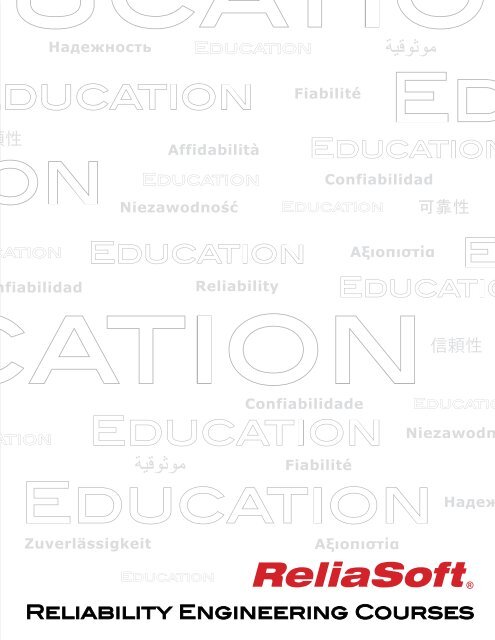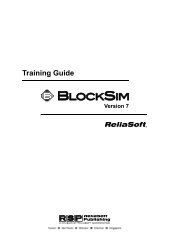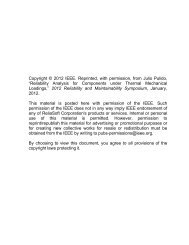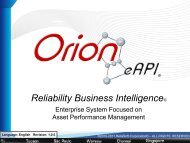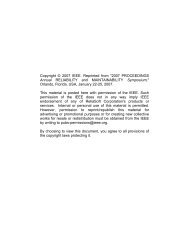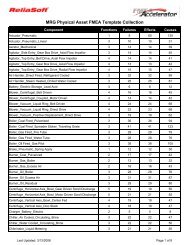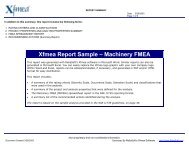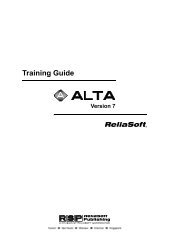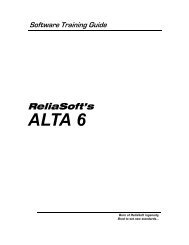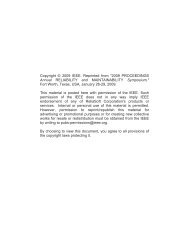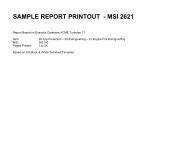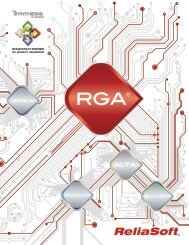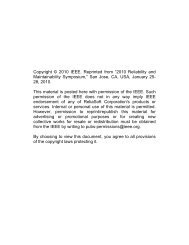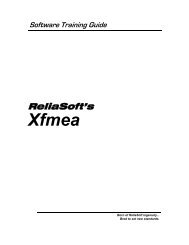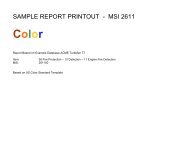Reliability Education 2011 - 2012 Training Catalog - ReliaSoft
Reliability Education 2011 - 2012 Training Catalog - ReliaSoft
Reliability Education 2011 - 2012 Training Catalog - ReliaSoft
You also want an ePaper? Increase the reach of your titles
YUMPU automatically turns print PDFs into web optimized ePapers that Google loves.
Comprehensive Curriculum to Meet Your <strong>Training</strong> Needs<strong>ReliaSoft</strong>’s course catalog addresses an array of important subjects in reliability engineering and related fields. We offer acombination of introductory and advanced courses on the subjects listed in this brochure, and we continue to expand ourcurriculum on an ongoing basis to meet the evolving needs of practitioners. In the following pages, you will find a briefsummary of each course, including the major topics covered and some of the ways that you can apply the concepts andsoftware that you will learn about. Next to each seminar’s description is a quick reference table to help you plan youreducation:``````````Course Prerequisites and Assumed Basic Knowledge: <strong>ReliaSoft</strong>’s seminars buildupon and complement each other to provide the balanced skill set that every reliabilityengineer deserves. This section will list specific <strong>ReliaSoft</strong> courses that are prerequisites fora seminar. Additionally, a course may assume a level of existing basic knowledge neededto fully benefit from the course. It is important to emphasize that courses withprerequisites leverage upon the assumed knowledge, and instructors will not backtrackto cover prerequisite material.Recommended Prior Course(s): These courses are not prerequisites, but rather arecourses that present related material that can enhance the learning experience of theattendee. <strong>ReliaSoft</strong> recommends taking these courses to understand the full scope of thematerial.Alternative/Similar Course(s): These courses are similar courses offered by <strong>ReliaSoft</strong>that have content akin to the given seminar but not necessarily the same focus.Next Recommended Course: This course is <strong>ReliaSoft</strong>’s suggestion for how best tocontinue your reliability education.Software Used: Software identified as Primary include a software usage andfamiliarization portion, while software identified as Supplemental include instruction ononly the functionality deemed necessary for accomplishing the tasks presented in that course.Duration: X daysCEUs: X.X CRP Credits: XCourse Prerequisites``X123Assumes Basic Knowledge Of``X ConceptRecommended Prior Course(s)``X234Alternative/Similar Course(s)``Y345Next Recommended Course``X567Software Used``Primary: X Software``Supplemental:X Other ApplicationsG300 is an introductory course in probability and statistics, covering the needed concepts andprinciples that one would get in a single semester course at a university level. It provides a highlevel overview of the main concepts and methods of probability theory and statistics needed inunderstanding and applying reliability engineering tools. Some of the topics covered include:Introduction to Probability and StatisticsElementary probability rules, theorem of BayesDiscrete and continuous random variables, failure rate, expectation and varianceJoint distributions, covariance, correlation, conditional distributions, load-strengthanalysisDescriptive statistics, histograms, sample mean and varianceParameter estimations, method of moments, maximum likelihood, Fisher informationInterval estimates, hypothesis testing and goodness of fitRegressions, linear and nonlinear approximationsSimulations, generating discrete and continuous variables, estimating probabilities andexpectationsRenewal theory with applications to replacement decisionsMarkov chains, with application to repairable and non-repairable systemsDuration: 3 daysCEUs: 2.1 CRP Credits: 0Course Prerequisites``NoneAssumes Basic Knowledge Of``Undergraduate Algebra``Elementary CalculusRecommended Prior Course(s)``N/AAlternative/Similar Course(s)``N/ANext Recommended Course``Any course based on interestSoftware Used``Primary: N/A``Supplemental: N/AApplying What You Will LearnG300 will be useful for practitioners in reliability and quality engineering in:``Becoming familiar with the special way of probabilistic thinking and how it relates to reliability engineering.``Applying, adopting and developing methods for solving practical problems.4
The immensely popular G400 course sets the foundation for all subsequent seminars byintroducing and familiarizing the attendee to the fundamental concepts in reliability engineeringmathematics, from basic data analysis and modeling to advanced methods and concepts. Itbegins with an in-depth discussion of the fundamentals of Weibull and Life Data Analysis andcontinues by expanding the learned concepts to more advanced subjects. Some of the topicscovered include:• <strong>Reliability</strong> block diagram (RBD) analysis and fault tree analysis• System reliability equation and metrics• Importance analysis and reliability allocation methods• Determining optimum maintenance intervals• <strong>Reliability</strong>, availability and maintainability analysis for complex repairable systemsStatistical models for repairable systems and applications• General renewal process and recurrent event data analysis• Fielded system analysis and modelingApplying What You Will LearnG400 presents concepts and software that will help you to:````Foundations of <strong>Reliability</strong> Engineering Data Analysis and ModelingDuration: 5 daysCEUs: 3.5 CRP Credits: 5Course Prerequisites``NoneAssumes Basic Knowledge Of``Undergraduate AlgebraIntroduction to reliability engineering principles and methods``Elementary Calculus• Overview of reliability engineering theory and related mathematics, metrics andapplications``Probability and StatisticsRecommended Prior Course(s)Fundamentals of life data analysis and applications``G300• Review of relevant statistical concepts(if needed for knowledge ofprobability and statistics)• <strong>Reliability</strong> data types and censoring schemesAlternative/Similar Course(s)• <strong>Reliability</strong> metrics and their interpretation``M440• In-depth look at the Weibull distributionNext Recommended Course• Other lifetime distributions``D560 or M560• Parameter estimation methodsSoftware Used• Confidence bounds``Primary: Weibull++• Mixed Weibull distribution``Supplemental:• Competing failure modes analysisALTA, BlockSim, RGA• Degradation data analysis• Warranty data analysis• Model and data set comparisons• <strong>Reliability</strong> test design• <strong>Reliability</strong> demonstration• Stress-strength analysis• Case studies and hands-on practice using Weibull++Advanced life data modeling and applications• Combining life-stress relationships with lifetime distributions• Quantitative accelerated life testing (ALT) data analysis with life-stress models for one or multiple stressesSystem analysis, modeling and applicationsUnderstand how life data analysis methodologies can be applied when you need to understand and communicate how aproduct will perform over time, such as:• Setting meaningful reliability targets, demonstrating whether an item meets the specification and/or effectivelycommunicating performance estimates to management.• Identifying whether an item will experience infant mortality and/or wearout and making predictions aboutperformance during the useful life (or warranty) period.• Evaluating suppliers and/or comparing designs based on reliability.Become familiar with the applications of other essential reliability data analysis methods, such as ALT, RBDs and RGA.6
G400A is truncated version of G400 and covers only the first three days of that course. Itintroduces and familiarizes the attendee to the core concepts in reliability engineeringmathematics and focuses on the fundamentals of Weibull and Life Data Analysis. Some of thetopics covered include:Introduction to reliability engineering principles and methods• Overview of reliability engineering theory and related mathematics, metrics andapplicationsFundamentals of life data analysis and applications• Review of relevant statistical concepts• <strong>Reliability</strong> data types and censoring schemes• <strong>Reliability</strong> metrics and their interpretation• In-depth look at the Weibull distribution• Other lifetime distributions• Parameter estimation methods• Confidence bounds• Mixed Weibull distribution• Competing failure modes analysis• Degradation data analysis• Warranty data analysis• Model and data set comparisons• <strong>Reliability</strong> test design• <strong>Reliability</strong> demonstration• Stress-strength analysis• Case studies and hands-on practice using Weibull++Applying What You Will LearnG400A presents concepts and software that will help you to:``Weibull and Life Data AnalysisDuration: 3 daysCEUs: 2.1 CRP Credits: 3Course Prerequisites``NoneAssumes Basic Knowledge Of``Undergraduate Algebra``Elementary Calculus``Probability and StatisticsRecommended Prior Course(s)``G300(if needed for knowledge ofprobability and statistics)Alternative/Similar Course(s)``G400, M440Next Recommended Course``D560 or M560Software Used``Primary: Weibull++``Supplemental: N/AUnderstand how life data analysis methodologies can be applied when you need to understand and communicate howa product will perform over time, such as:• Setting meaningful reliability targets, demonstrating whether an item meets the specification and/or effectivelycommunicating performance estimates to management.• Identifying whether an item will experience infant mortality and/or wearout and making predictions aboutperformance during the useful life (or warranty) period.• Evaluating suppliers and/or comparing designs based on reliability.What People are Saying about <strong>ReliaSoft</strong>’s Seminars“The <strong>ReliaSoft</strong> Seminars are a MUST for everyreliability professional. Excellent training!”- Nektarios Papasavvas“One of the bestcourses I have been to.”- Linton Lewis“This is perhaps the best seminar I have ever attended. Bringingmy real world test data and having working ‘Labs’ during theseminar was a stroke of genius! The technical knowledge of the<strong>ReliaSoft</strong> staff is incredible. Every question is answered and allconcepts are covered in sufficient detail. The real life work labsensure a working knowledge of the software.”- Leonard Badour“Appropriate and practical informationdelivered in a ‘down to earth’ manner.”- John Scweitzer“Excellent. Dove right in and learned theinner workings of the software.”- Brian Roth7
M440 provides an overview of the ways in which reliability engineering concepts and methodscan be applied for repairable systems analysis and maintenance planning. Some of the topicscovered include:The Role of <strong>Reliability</strong> Engineering in MaintenanceLife Data Analysis• Statistical background• Commonly used product lifetime distributions and reliability metrics• Parameter estimation and confidence bounds• <strong>Reliability</strong> specifications• Competing failure modes• Comparing data sets• Degradation analysis• Event/maintenance logs analysisRepairable Systems Analysis• Understanding the concept of a renewal process• Examining a common mistake in repairable systems analysis and two methodsavailable for proper analysis:• Recurrent event data analysis (RDA)• <strong>Reliability</strong> block diagrams (RBDs)Recurrent Event Data Analysis• Non-homogeneous Poisson process (NHPP)• Non-parametric recurrent event data analysis (using the Mean Cumulative Function, MCF)• General renewal process (GRP)• What RDA can and can’t do for you<strong>Reliability</strong> Block Diagrams• RBD configurations and their analytic quantification: series, simple parallel, k-out-of-n, complex configurations, loadsharing, standby redundancy and other specialized diagram constructs• <strong>Reliability</strong> importance• Using simulation for maintainability/availability analysis• Restoration factors• Determining when preventive maintenance (PM) makes sense and determining the optimum interval• Considering crews, spare parts and costs• Common metrics and new options for visualizing and improving system availability• Introductions to throughput analysis and life cycle cost estimation• Introduction to reliability phase diagrams• Comparison of RDA vs. RBDIntroduction to reliability centered maintenance (RCM)Applying What You Will LearnM440 presents concepts and software that you could use to help your organization:````````<strong>Reliability</strong> and Maintainability Analysis for Repairable SystemsDuration: 5 daysCEUs: 3.5 CRP Credits: 5Course Prerequisites``NoneAssumes Basic Knowledge Of``Undergraduate Algebra``Elementary Calculus``Probability and StatisticsRecommended Prior Course(s)``G300(if needed for knowledge ofprobability and statistics)Alternative/Similar Course(s)``G400Next Recommended Course``M560Software Used``Primary: Weibull++, BlockSim``Supplemental: RGA, RCM++Understand the array of methodologies that can be applied for repairable systems analysis and determine theapproaches that will be most effective for the data you have and the objectives you wish to achieve.Identify critical components (or failure modes) and determine the most effective ways to improve system performancethrough design improvements and/or maintenance planning.Evaluate potential maintenance strategies and calculate optimum PM intervals and/or overhaul times.Use simulation to obtain estimated performance metrics that can facilitate decision-making in a variety of areas, such asscheduling planned maintenance, planning for spares, identifying bottlenecks in production throughput and estimatinglife cycle costs.8
Effective FMEA Seminar Series - D470This series is composed of two course sessions, taught over five days. Although you can register for each session individually,we recommend that new students start with the full five-day package, offered as D470. D470A “Foundations of EffectiveFMEAs” is a prerequisite for D470B “FMEA Facilitation and Application Skills.”D470A provides an overview of the concepts and procedures for FMEA, FMECA and relatedanalyses, with an emphasis on the use of <strong>ReliaSoft</strong>’s Xfmea software for analysis, datamanagement and reporting. Some of the topics covered include:Preparing for the analysis and identifying functions, failures, effects, causes and controlsCommonly used risk assessment methodologies: Risk Priorities Numbers (RPNs) andCriticality AnalysisIdentifying and tracking the completion of recommended actionsIntegrating the FMEA with other quality analyses, such as Design Reviews Based onFailure Mode (DRBFMs), DVP&Rs, Process Flow Diagrams and Control PlansHands-on practice with the Xfmea softwareApplying What You Will LearnD470A presents concepts and software that you could use to help your organization:``````Foundations of Effective FMEAsProactively consider potential failures, prioritize issues based on risk and then initiateimprovements early in development when modifications tend to have the biggest impactfor the lowest cost.Create a searchable knowledge base of reliability-related information for your designs, which can contribute to thedevelopment of test plans, control plans, future design efforts and other activities.Comply with supplier or regulatory requirements while promoting analysis and data management processes that areefficient and effective, utilizing lessons learned from past analyses when applicable.FMEA Facilitation and Application SkillsDuration: 3 daysCEUs: 2.1 CRP Credits: 3Course Prerequisites``NoneAssumes Basic Knowledge Of``<strong>Reliability</strong> EngineeringMethods and ConceptsRecommended Prior Course(s)``N/AAlternative/Similar Course(s)``M480ANext Recommended Course``D470BSoftware Used``Primary: Xfmea``Supplemental: N/AD470B uses case study examples to enable attendees to practice FMEA facilitation andapplication skills. Some of the topics covered include:Key factors for effective FMEA projects, including ways to avoid common mistakes andthe characteristics of successful FMEA facilitationCase study examples to practice FMEA facilitation and application skillsHands-on practice with the Xfmea softwareApplying What You Will LearnD470B presents concepts and software that you could use to help your organization:``Efficiently and effectively run FMEA team meetings.``Avoid common mistakes experienced in industry and maximize buy-in from stakeholders.Duration: 2 daysCEUs: 1.4 CRP Credits: 2Course Prerequisites``D470AAssumes Basic Knowledge Of``<strong>Reliability</strong> EngineeringMethods and ConceptsRecommended Prior Course(s)``D470AAlternative/Similar Course(s)``M480BNext Recommended Course``G400 or M440, D560 or M560Software Used``Primary: Xfmea``Supplemental: N/A9
G475 introduces the fundamentals of Failure Reporting, Analysis and Corrective Action Systems(FRACAS), with an emphasis on the configuration and use of <strong>ReliaSoft</strong>’s XFRACAS software forincident reporting, failure analysis, problem resolution and other related analyses. Some of thetopics covered include:Common organizational issues related to FRACASApplications and benefits of FRACAS for different entities within the organizationThe FRACAS process, from incident reporting through failure analysis to problemresolutionProblem resolution methodologies, including 8 Disciplines (8D) and DMAIC, as well asDesign for Six Sigma methodologies such as DMADV and IDOVBest practices and tailoring FRACAS to the needs of the business; avoiding failedimplementationsHands-on practice with the XFRACAS softwareApplying What You Will LearnG475 presents concepts and software that you could use to help your organization:````FRACAS Principles and ApplicationsDuration: 2 daysCEUs: 1.4 CRP Credits: 2Course Prerequisites``NoneAssumes Basic Knowledge Of``<strong>Reliability</strong> EngineeringMethods and ConceptsRecommended Prior Course(s)``G400Alternative/Similar Course(s)``N/ANext Recommended Course``Any course based on interestSoftware Used``Primary: XFRACAS``Supplemental: N/AImplement a closed-loop process for responding to reported failures, identifying the rootcause of failure and coordinating the activities necessary to effectively resolve problems.Create a searchable knowledge base of lessons learned that can be a resource for customer support and future designefforts, as well as field failure data that can be analyzed to identify emerging issues, quantify reliability growth, plan forexpected failures under warranty, etc.What People are Saying about <strong>ReliaSoft</strong>’s Seminars“Very well done... Informative. Exactly what we needed.”- Floyd Doctor“Excellent examples...Excellent instructor.”- Jim Casella”This is really a mind-blowing seminar. It will really add value to our work.”- Sunil Ayyawar“This is perhaps the best seminar I have everattended... The technical knowledge of the <strong>ReliaSoft</strong>staff is incredible. Every question is answered and allconcepts are covered in sufficient detail.”“Terrific Seminar! It was very thorough andpractical. Time and money well spent!”- Steve Michalak- Leonard BadourRead more testimonials athttp://Seminars.<strong>ReliaSoft</strong>.com/semquotes.htm10
M480A provides an overview of the fundamental <strong>Reliability</strong> Centered Maintenance (RCM)techniques and procedures, with an emphasis on the use of <strong>ReliaSoft</strong>’s RCM++ software fordata capture, analysis and reporting. Some of the topics covered include:Preparing for the analysis and selecting the equipment to be analyzedIdentifying the functions and functional failuresIdentifying and evaluating (categorizing) the effects of failureIdentifying the causes of failureSelecting scheduled maintenance tasks• Comparing maintenance strategies based on cost and availability• Calculating optimum maintenance intervalsHands-on practice with the RCM++ softwareApplying What You Will LearnM480A presents concepts and software that you could use to help your organization:``````Effective RCM Seminar Series - M480This series is composed of two course sessions, taught over five days. Although you can register for each session individually,we recommend that new students start with the full five-day package, offered as M480. M480A “RCM Principles andApplications” is a prerequisite for M480B “RCM Facilitation and Application Skills.”RCM Principles and ApplicationsDevelop a scheduled maintenance plan for a physical asset that will provide anacceptable level of functionality, with an acceptable level of risk, in an efficient andcost-effective manner.Evaluate whether preventive maintenance is appropriate and determine optimum maintenance intervals.Promote analysis processes that are more efficient and more effective, utilizing lessons learned from past analyses whenapplicable.RCM Facilitation and Application SkillsDuration: 3 daysCEUs: 2.1 CRP Credits: 3Course Prerequisites``NoneAssumes Basic Knowledge Of``<strong>Reliability</strong> EngineeringMethods and ConceptsRecommended Prior Course(s)``M440 or G400Alternative/Similar Course(s)``D470ANext Recommended Course``M480BSoftware Used``Primary: RCM++``Supplemental: N/AM480B uses case study examples to enable attendees to practice RCM facilitation andapplication skills. Some of the topics covered include:Key factors for effective RCM projects, including ways to avoid common mistakes andthe characteristics of successful RCM facilitationCase study examples to practice RCM facilitation and application skillsHands-on practice with the RCM++ softwareApplying What You Will LearnM480B presents concepts and software that you could use to help your organization:``Efficiently and effectively run RCM and FMEA team meetings.``Avoid common mistakes experienced in industry and maximize buy-in from stakeholders.Duration: 2 daysCEUs: 1.4 CRP Credits: 2Course Prerequisites``M480AAssumes Basic Knowledge Of``<strong>Reliability</strong> EngineeringMethods and ConceptsRecommended Prior Course(s)``M480A, M440 or G400Alternative/Similar Course(s)``D470BNext Recommended Course``M560 or D560Software Used``Primary: RCM++``Supplemental: N/A11
RBI Overview and ApplicationM485 provides an introduction to risk based inspection analysis based on API RP 580/581, withan emphasis on applying <strong>ReliaSoft</strong>’s RBI software for both qualitative and quantitative analyses.Some of the topics covered include:Purpose of an RBI program and how it differs from traditional inspection techniquesUnderstanding risk as a metricBrief introduction into qualitative analysis using FMEA structure based on API RP 580Limitations of API RP 581Quantitative analysis of probability of failure and consequence of failure for staticequipment based on API RP 581Quantification and analysis of probable riskRecommended inspections between turnaround dates, if requiredHands-on practice with the RBI softwareApplying What You Will LearnM485 presents concepts and software tools that you could use to help your organization:``Understand how risk based inspection can be more efficient in terms of both safety andcost.``Apply risk based inspection analysis by either qualitative or quantitative analysis.Duration: 2 daysCEUs: 1.4 CRP Credits: 2Course Prerequisites``M480AAssumes Basic Knowledge Of``<strong>Reliability</strong> EngineeringMethods and ConceptsRecommended Prior Course(s)``M480A, M440 or G400Alternative/Similar Course(s)``N/ANext Recommended Course``Any course based on interestSoftware Used``Primary: RBI``Supplemental: N/AD490 provides an overview of standards based reliability prediction techniques, with an emphasison the use of <strong>ReliaSoft</strong>’s Lambda Predict software. Some of the topics covered include:Overview of standards based reliability predictionUsing Lambda Predict to build a system and generate results/plots based on any of themajor prediction standards:• MIL-HDBK-217, Bellcore/Telcordia and FIDES (for electronic components)• NSWC (for mechanical components)Allocation methods (such as Feasibility of Objective, AGREE, ARINC and others)Derating analysis to point out components that are over the established margin of safetyHands-on practice with the Lambda Predict softwareApplying What You Will LearnD490 presents concepts and software that you could use to help your organization:``````Standards Based <strong>Reliability</strong> PredictionObtain an initial indication of whether a design will be able to meet reliability objectivesand identify potential problem areas early in development.Compare design alternatives and/or trade-off system design factors.Duration: 2 daysCEUs: 1.4 CRP Credits: 2Course Prerequisites``NoneAssumes Basic Knowledge Of``<strong>Reliability</strong> EngineeringMethods and ConceptsRecommended Prior Course(s)``N/AAlternative/Similar Course(s)``N/ANext Recommended Course``Any course based on interestSoftware Used``Primary: Lambda Predict``Supplemental: N/AConsider environmental and other stress factors that have a significant impact on system performance yet mayotherwise be overlooked.12
G511 provides an overview of reliability growth analysis models and their application for datacaptured from developmental (reliability growth) testing and also from fielded repairablesystems. Some of the topics covered include:D521 explores advanced concepts and applications for quantitative accelerated life testing dataanalysis, including tests with multiple stresses or time-varying stresses. Some of the topicscovered include:Overview of life data analysis concepts and methodologiesTypes of accelerated testsAccelerated life testing applicationsStress loading models: single constant stress, multiple constant stresses, time-varyingstressesMaximum likelihood estimation (MLE) methods for data analysisAscertaining model fit and verifying assumptionsObtaining the pdf for normal use conditions, either for a constant use stress or fortime-varying stress levelsAccelerated life testing methods and test design considerationsAccelerated degradation and agingHands-on practice with the ALTA PRO softwareApplying What You Will LearnD521 presents concepts and software that you could use to help your organization:``````<strong>Reliability</strong> Growth Analysis• <strong>Reliability</strong> growth planning and management strategies• Duane reliability growth postulate• Crow (AMSAA) reliability growth tracking model and the Crow Extended model forprojections based on proposed future corrective actions• <strong>Reliability</strong> growth confidence intervals and goodness-of-fit testsRepairable (Fielded) System Analysis• Using the power law model to analyze operational test data or customer use datafrom fielded systems• Methods for warranty analysis, optimum replacement and overhaul analysis• Analyzing the overall reliability trend for a fleet of systems• Methods to evaluate reliability growth for fielded systems based on proposedupgrades and improvementsHands-on practice with the RGA softwareApplying What You Will LearnG511 presents concepts and software that you could use to help your organization:````Application of <strong>Reliability</strong> Growth Models in Developmental Testingand Fielded SystemsAnalyze data from developmental tests in order to quantify reliability growth and determine the feasibility of achievingreliability goals with a given test/fix strategy.Analyze data from fielded systems in order to calculate optimum overhaul times and other results without the detaileddata sets that would normally be required for repairable system analysis.Advanced Quantitative Accelerated Life Testing AnalysisDuration: 3 daysCEUs: 2.1 CRP Credits: 3Course Prerequisites``NoneAssumes Basic Knowledge Of``Undergraduate Algebra``StatisticsRecommended Prior Course(s)``G400Alternative/Similar Course(s)``N/ANext Recommended Course``Any course based on interestSoftware Used``Primary: RGA``Supplemental: N/ADuration: 3 daysCEUs: 2.1 CRP Credits: 3Course Prerequisites``G400Assumes Basic Knowledge Of``Undergraduate Algebra``Elementary Calculus``Probability and StatisticsRecommended Prior Course(s)``G400Alternative/Similar Course(s)``N/ANext Recommended Course``Any course based on interestSoftware Used``Primary: ALTA and ALTA PRO``Supplemental: Weibull++Significantly reduce the test time required to obtain reliability metrics for a product, which can result in fastertime-to-market, lower product development costs and improved designs.Understand and quantify the effects of stress (or other factors) on product life.Design accelerated tests that will be the most effective to achieve desired objectives.13
This series consists of two sessions that both focus on system modeling and simulation. You can attend the entire 5-dayseries, offered as G522, or register for either course separately.G522A explores advanced concepts and applications for system reliability/maintainability analysisand optimization utilizing a reliability block diagram (RBD) or fault tree analysis (FTA) approach.Some of the topics covered include:RBD configurations and fault tree gates and events, with their analytic quantification<strong>Reliability</strong> importance and optimum reliability allocationIntroduction to discrete event simulation and fundamentals of system maintainability andavailability analysisDetermining when preventive maintenance (PM) makes sense and determining theoptimum PM intervalConsidering crews, spare parts and costsCommonly used metrics and new options for visualizing and improving system availabilityIntroductions to throughput analysis and life cycle cost estimationIntroduction to reliability phase diagramsHands-on practice using the BlockSim softwareApplying What You Will LearnG522A presents concepts and software that you could use to help your organization:````Identify critical components (or failure modes) and determine the most effective ways toimprove system performance through design improvements and/or maintenance planning.Use simulation to estimate performance metrics that can facilitate decision-making in a variety of areas, such asscheduling maintenance, planning for spares, identifying bottlenecks in production and estimating life cycle costs.G522B focuses on the principles of probabilistic event and risk analysis using simulationtechniques, with an emphasis on using <strong>ReliaSoft</strong>’s RENO software to graphically build simulationsutilizing flowcharts. This course also explores advanced risk and reliability analysis methodsthrough integration with analyses from other Synthesis applications including RBDs and/or faulttrees created in BlockSim. Some of the topics covered include:Deterministic vs. probabilistic analysisIntroduction to simulationIntroduction to RENOBasics of risk/decision analysisApplications of quantitative decision and risk analysesUsing BlockSim (and other Synthesis analyses) in RENO diagramsMultiple case studies and applicationsHands-on practice using the RENO softwareApplying What You Will LearnG522B presents concepts and software that you could use to help your organization:````System Modeling and Simulation Seminar Series - G522System <strong>Reliability</strong> and Maintainability Analysis and OptimizationSimulation Modeling for <strong>Reliability</strong> and Risk AnalysisDefine a problem, conceptualize how to obtain a solution via simulation, implement theflowchart in RENO, validate the model and use plots and other metrics to analyze andvisualize the simulation results.Duration: 3 daysCEUs: 2.1 CRP Credits: 3Course Prerequisites``G400Assumes Basic Knowledge Of``Undergraduate Algebra``Elementary Calculus``Probability and StatisticsRecommended Prior Course(s)``G400Alternative/Similar Course(s)``M440Next Recommended Course``G522BSoftware Used``Primary: BlockSim``Supplemental:Weibull++, RCM++, XfmeaDuration: 2 daysCEUs: 1.4 CRP Credits: 2Course Prerequisites``G400Assumes Basic Knowledge Of``Undergraduate Algebra``Elementary Calculus``Probability and StatisticsRecommended Prior Course(s)``G400, G522A, G588Alternative/Similar Course(s)``N/ANext Recommended Course``Any course based on interestSoftware Used``Primary: RENO``Supplemental:BlockSim, DOE++Perform multiple simulations to evaluate how key inputs will affect the results (sensitivity analysis), or to automaticallyestimate optimum values.14
Design for <strong>Reliability</strong> (DFR) Program Planning and ImplementationD560 is a five-day course that expands upon and replaces our popular three-day RS 560. Itprovides both a complete DFR framework and a step-by-step application of the framework.The course provides a complete DFR plan that can be customized to meet specific needs. Italso teaches how to apply each step in the process through an extensive hands-on portion thatuses a simulated team development environment, with the students taking on different rolesduring the product development process. Some of the topics covered include:Introduction• The “Hows” of a world-class DFR processConcept Phase Activities• Creating a good DFR plan outlining the sequential activities and their dependencies• Understanding and quantifying environmental and usage conditions and settingreliability requirements and goalsDesign Phase Activities• Risk discovery analysis, change point analysis and design FMEA (DFMEA)• Design risk and safety analysis• Fault tree analysis (FTA), event trees, risk-based simulations, DOE methods• Critical to risk and safety cause mitigation• Design reliability analysis• Failure mode reliability analysis (FMRA), reliability block diagrams (RBDs),importance metrics, sensitivity analysis, baseline reliability and reliabilityallocation• Critical to reliability cause mitigation• Design maintainability and supportability analysis• Critical to maintainability and supportability cause mitigationDevelopment and Testing Phase Activities• FRACAS implementation and usage• Component testing, accelerated testing, reliability growth• Subsystem, system and field testingManufacturing Phase Activities• Process FMEA (PFMEA)• Volume manufacturing and/or supplier control planSupport Phase• Field issues, warranty data analysis and forecasting• <strong>Reliability</strong> based diagnostics and repair guidesClosing the Loop• Communicating, updating and maintaining knowledge itemsDuration: 5 daysCEUs: 3.5 CRP Credits: 5Course Prerequisites``G400Assumes Basic Knowledge Of``Undergraduate Algebra``Elementary Calculus``Probability and StatisticsRecommended Prior Course(s)``G300 (if needed forknowledge of probability andstatistics), G400Alternative/Similar Course(s)``M560Next Recommended Course``Any course based on interestSoftware Used``Primary: Synthesis Platform``Supplemental:Synthesis ApplicationsApplying What You Will LearnD560 presents concepts and software that you could use to help your organization:````````Gain an understanding of the methods, terms and metrics used in reliability, when to apply particular tools during theproduct development life cycle and the associated benefits and drawbacks of each.Implement a holistic DFR process in product/system design environments and leverage the benefits of this process,namely the Faster, Better, Cheaper values that drive the <strong>Reliability</strong> 3.0 process.Build an effective reliability culture within the organization and help to determine what needs to be added or improvedin your DFR initiatives.Evaluate your strengths in each methodology, which will serve as a guide for any additional skills you may need toacquire or augment.15
M560 uses a program planning approach focusing on the reliability methods and tools thatsupport the needs of maintenance planning and Asset Performance Management (APM). Thecourse provides a complete planning template that can be customized to meet specific needs. Italso teaches how to apply each step in the process through an extensive hands-on portion thatuses a simulated team development environment, with the students taking on different rolesduring the planning and implementation process. Some of the topics covered include:Introduction``Elementary Calculus• Overview of reliability engineering activities, tools and methods``Probability and StatisticsDefine and Identify Phase ActivitiesRecommended Prior Course(s)• Creating a plan outlining the sequential activities (and their dependencies) that will be ``G300 (if needed forundertaken during the maintenance planning and implementation processknowledge of probability and• Identifying the data/information needed, including existing historical data and data statistics), G400 or M440sourcesAlternative/Similar Course(s)• Understanding, setting and quantifying reliability requirements/goals and related ``D560Key Process Indicators (KPIs)Next Recommended Course• Risk discovery and maintenance significant items (MSI) selection``Any course based on interestAssess, Analyze and Quantify Phase ActivitiesSoftware Used• RCM/FMEA analysis``Primary: Synthesis Platform• Historical data analysis methods and model building``Supplemental:• Weibull and life data analysis and modelingSynthesis Applications• Degradation (inspection) data analysis and modeling• Recurrent event (repairable system) data analysis and modeling• Risk and safety analysis• Fault tree analysis (FTA), event trees, risk-based simulations• Critical to risk and safety cause mitigation• <strong>Reliability</strong> analysis• Failure mode reliability analysis (FMRA), reliability block diagrams (RBDs), importance metrics, sensitivity analysis,baseline reliability and reliability allocation• Critical to reliability cause mitigation• Maintainability and supportability analysis• Availability, throughput and life cost analysis using simulations• Critical to maintainability and supportability cause mitigationOptimize and Improve Phase Activities• Optimization of tasks and resources• CMMS and FRACAS implementation and usageContinued Sustainment Phase Activities• <strong>Reliability</strong>-based diagnostics and repair guidesClosing the Loop• Communicating, updating and maintaining knowledge itemsApplying What You Will LearnM560 presents concepts and software that you could use to help your organization:````````<strong>Reliability</strong>-Based Program Planning and Implementation in AssetManagementDuration: 5 daysCEUs: 3.5 CRP Credits: 5Course Prerequisites``G400 or M440Assumes Basic Knowledge Of``Undergraduate AlgebraGain an understanding of the methods, terms and metrics used in reliability, when to apply particular tools duringdifferent stages of asset management and the associated benefits and drawbacks of each.Implement a holistic reliability-based process in asset performance management environments and leverage the benefitsof this process, namely the Faster, Better, Cheaper values that drive the <strong>Reliability</strong> 3.0 process.Build an effective reliability culture within the organization and help to determine what needs to be added or improvedin your APM initiatives.Evaluate your strengths in each methodology, which will serve as a guide for any additional skills you may need toacquire or augment.16
G588 begins with the fundamentals of Design of Experiments (DOE) methods and continueswith advanced concepts, principles and requirements. Some of the topics covered include:A brief history and some typical applications of DOE methodsAn overview of basic statistical conceptsBasic principles of DOEExperiments for comparisonExperiments for screening important factorsExperiments for optimization, response surface methodologyRobust design (Taguchi designs)Experiments for improving product reliabilityHands-on practice with the DOE++ softwareApplying What You Will LearnG588 presents concepts and software that you could use to help your organization:``````Applications of Experiment Design and Analysis in <strong>Reliability</strong> EngineeringDesign experiments that are effective for studying the factors that may affect a productor process.Analyze experiment results in order to identify the significant factors and evaluate waysto improve and optimize the design.Duration: 3 daysCEUs: 2.1 CRP Credits: 3Course Prerequisites``G400Assumes Basic Knowledge Of``Undergraduate Algebra``Elementary Calculus``Probability and StatisticsRecommended Prior Course(s)``G400Alternative/Similar Course(s)``N/ANext Recommended Course``G522B or any course basedon interestSoftware Used``Primary: DOE++``Supplemental: RENOGo beyond traditional DOE techniques in order to apply the proper analysis treatment for the response information thatis often of interest to reliability engineers — product lifetime data.Introduction to the Synthesis APIG902 provides students with an overview of the mechanics and elements needed to use theSynthesis API (Application Programming Interface) to integrate the Synthesis Platform withother platforms/software, including computerized maintenance management systems (CMMS)and product lifecycle management (PLM) systems. Some of the topics covered include:Introduction• What is the Synthesis API?• Interaction with Synthesis software• Where to use the Synthesis API• The two types of API applicationsAPI Overview• Understanding the available resources• Where and how to use the Synthesis API• Development of the Synthesis API within your organizationLearning from Examples• Review and understand the API calls through example case studies in Microsoft’sVisual Studio .NET and in Excel VBAHands-on Exercises and Case Studies• Put the learned concepts to work by building simple applications that leverage theSynthesis APIApplying What You Will LearnG902 presents concepts and software that you could use to help your organization:``Integrate the Synthesis Platform with third-party systems.``Leverage Synthesis Platform engines for reliability data management and analysis.Duration: 2 daysCEUs: 1.4 CRP Credits: 2Course Prerequisites``G400Assumes Basic Knowledge Of``Microsoft .NET Development` ` Visual Basic or C#Programming LanguagesRecommended Prior Course(s)``D560 or M560(to better understand APIapplication in reliabilityprogram implementation)Alternative/Similar Course(s)``N/ANext Recommended Course``Any course based on interestSoftware Used``Primary: The Synthesis API``Supplemental:Synthesis Applications17
Registration InformationHow to Register for Public Events Offered Worldwide Throughout the YearMany of <strong>ReliaSoft</strong>’s training courses are offered as public seminars and are scheduled throughout the year in the United Statesas well as in South America, Europe, Asia Pacific, India, China, the Middle East and Australia. The current public training scheduleis available at http://Seminars.<strong>ReliaSoft</strong>.com/dates.htm. There are several convenient ways to register for public training events.Online Store: For events in North America, Europe, Asia Pacific, the MiddleEast and Australia, register via the web at http://www.<strong>ReliaSoft</strong>Store.com.Registration Form: Print and submit a registration form, using theappropriate link in the online seminar calendar.Contact <strong>ReliaSoft</strong>: Contact the <strong>ReliaSoft</strong> office that is organizing theseminar or the office that serves your region. Contact details are shown onthe back of this booklet and at http://Directory.<strong>ReliaSoft</strong>.com.“First time I felt my money and timewere well used and invested intraining!”- Jorge VasquezOn-Site Seminars Also Available<strong>ReliaSoft</strong>’s expert instructors are also available to present any of <strong>ReliaSoft</strong>’s training courses at a specified time and location thatmeets your organization’s needs. These on-site seminars can save time and money for your organization and also allow you toenjoy the benefit of having our expert instructors focus the training on topics that are critical to your projects. This is a greatalternative to public seminars when five or more staff members require training. Please contact <strong>ReliaSoft</strong> to discuss yourparticular on-site training requirements.Registration FeesThe registration fee for each individual course is posted on the website. All registration fees include:Printed or electronic copies of the lecture notes and any applicable software practice guides.Evaluation copies of the <strong>ReliaSoft</strong> software used in the course.A certificate of attendance that notes the eligible continuing education credit values (CEUs) and CRP credits earned bycompleting the course.For public seminars, the fee includes a variety of snacks served daily. In some venues, lunch is also provided. (For detailsfor a particular event, please contact the organizer.)All Courses Use ComputersFor events held at the <strong>Reliability</strong> <strong>Training</strong> Center (RTC) in Tucson, computers will be available to use free of charge. In someother venues, <strong>ReliaSoft</strong> may offer to provide a PC for an additional rental fee (indicated when you register for the course ifavailable). For all other situations, please plan to bring your own laptop; your registration confirmation will include instructionsto prepare it with the software that will be needed.Available DiscountsYou may be eligible for one of the following discounts on standard registration fees:Combined Session Discounts: When possible, <strong>ReliaSoft</strong> offers multiple training courses in the same location over thespan of a week. This helps minimize travel costs and allows you to take advantage of any combined session discounts.Group Discount: <strong>ReliaSoft</strong> offers a 10% discount when three or moreattendees from the same corporate entity and the same location registertogether for an event.Software Purchase Discounts (“Bundles”): <strong>ReliaSoft</strong> offers bundledpricing discounts when you purchase software in conjunction with trainingseminars. For details and availability in your region, please visithttp://www.<strong>ReliaSoft</strong>.com/bundles.htm.Repeat Registration Discount: <strong>ReliaSoft</strong> offers a 50% discount when youregister again for any training course you have previously attended.“Great class, great instructor. I learned atremendous amount outside of the classtoo because of the knowledgeable[instructors] and willingness of the folksfrom <strong>ReliaSoft</strong> to answer any and everyquestion!”- Joe Marksteiner18
Take the <strong>Training</strong> Curriculum a Step FurtherThe Certified <strong>Reliability</strong> Professional (CRP) program provides an excellent opportunity to apply the knowledge you havegained through seminar participation by completing a results-oriented project that benefits your organization — and to berecognized for your accomplishments!Certified <strong>Reliability</strong> Professional ProgramThe Certified <strong>Reliability</strong> Professional (CRP) program has been designed to distinguish professionals who have gained andsuccessfully demonstrated unquestionable expertise in the field of reliability engineering. There are three elements toachieving certification: Learn, Apply and Present. By addressing each of these elements, candidates earn the CRP creditsthat are required to achieve certification. Full program details can be found on the web at http://<strong>Reliability</strong>Professional.org.A brief summary is provided here.Learn - Course RequirementYou will earn 20 of the 40 CRP credits by participating in eligible training courses. In order to assure that all Certified<strong>Reliability</strong> Professionals possess the minimum required skills for performing reliability-related work, a core curriculum isrequired. Participants may then select additional approved courses in order to complete the 20 credit requirement.Apply - Project RequirementYou will earn 15 of the 40 CRP credits by completing a project that demonstrates your ability to apply the learned bodyof reliability engineering knowledge in a way that will benefit your organization. In order to achieve the credit, you mustsubmit a Project Proposal, Mid-Way Status Report and Final Report for approval by a Project Mentor and the CRP Board.Present - Publication RequirementYou will earn 5 of the 40 CRP credits by publishing the results and lessons learned from yourproject experience via an industry conference or professional journal. A variety of publication/presentation venues are acceptable, including (but not limited to) the International Applied<strong>Reliability</strong> Symposium (ARS), the Annual <strong>Reliability</strong> and Maintainability Symposium (RAMS), theInternational Journal of <strong>Reliability</strong>, Quality and Safety Engineering and the IEEE Transactions on<strong>Reliability</strong>.Group CertificationWe also provide support for Engineering Managers who wish to certify several engineers at the same time withtraining objectives to meet your organization’s specific goals. For example, if your organization is focused on aparticular aspect of reliability (such as Design for <strong>Reliability</strong> or Asset Performance Management), we can workwith your team to develop a detailed schedule of recommended courses to better suit those specific needswhile ensuring that all requirements for CRP certification are met. For details, please contactCRPAdmin@<strong>ReliaSoft</strong>.com or the <strong>ReliaSoft</strong> office that serves your region.AdministrationThe CRP program was initiated and is administered by <strong>ReliaSoft</strong> Corporation and its partners/distributors worldwide. Theprogram provides a web-based system to manage and track your progress toward certification. When you have completedall program requirements, a record of your certification can be published on the CRP website.http://www.<strong>Reliability</strong>Professional.org19
Frequently Asked QuestionsHow far ahead do I need to register for a course?In general, the sooner the better. Certain seminars do sell out. Therefore, it wouldbe best to register as soon as you have made your decision to attend.How important are the specified prerequisites?“One of the best I have attended. Veryvaluable and I learned something I canuse. Excellent instructor.”- John LodsVery important. Even though <strong>ReliaSoft</strong> will allow you to register without havingattended the prerequisite course(s), we strongly advise against it unless you already possess equivalent knowledge. Ourinstructors assume that the prerequisite knowledge is present and, to be fair to all, will not regress to cover prerequisitematerial.Who is the instructor?The pool of instructors for <strong>ReliaSoft</strong>’s training courses includes some of the creators of <strong>ReliaSoft</strong>’s software and experiencedpractitioners from both academia and industry. Short biographies for current instructors are posted on the website. Theinstructor for any particular seminar is selected based on the topic and individual availability. To inquire about the instructorassigned to a specific event, please contact <strong>ReliaSoft</strong>.Where will the seminars be held?Public training seminars are held in various U.S. and international locations at hotels or training centers that have beenselected to provide comfort and facilitate instruction. For more information, please review the “Venue” information providedon the website for the specific seminar that you will be attending.Do I need to make my own hotel reservations?Yes. Although we usually arrange a block of rooms (at special rates) at hotels where the training is being held (or near thetraining facilities being used), <strong>ReliaSoft</strong> does not make individual room reservations. You will need to contact hotels on yourown.May I use my own laptop?Yes. We encourage you to bring your own laptop for courses that feature hands-on software training. If you do not have theapplicable software already installed, please make sure you have the appropriate permissions to install educational (expiring)versions of the tools. For events held at the <strong>Reliability</strong> <strong>Training</strong> Center (RTC) in Tucson, computers will be available to use freeof charge. In some other venues, <strong>ReliaSoft</strong> may offer to provide a PC for an additional rental fee. When available, this optionwill be displayed when you register for the course.Are class materials sent to attendees prior to the event?When you register for any seminar, you will receive an e-mail with all instructions and materials necessary for you to reviewbefore attending the event. If you wish to familiarize yourself with the subject prior to the event, theoretical references forsome topics (including in-depth eTextbooks) can be found on the web at http://www.weibull.com. You can also access a freetrial version of the software and a multitude of practical examples from the web at http://www.<strong>ReliaSoft</strong>.com.Will I earn continuing education credits (CEUs)?Yes. Attendees are eligible for 0.1 educational units per contact hour. In addition, you can earn credit toward certificationunder the Certified <strong>Reliability</strong> Professional (CRP) program. The eligible credits are listed in this brochure and on the web.What happens if I am not able to attend a seminar that Iregistered for?Depending on the nature of your registration and when you notify <strong>ReliaSoft</strong> of yourchange in plans, you may have the option to substitute another person to attendthe seminar in your place, transfer to another upcoming scheduled seminar or, withsufficient advanced notice, cancel for a full refund. Specific conditions are listed inyour registration form.“This was the best class I have had inmy 23-year career. The training guide isvery complete and user-friendly. Thisclass is equivalent to many of mymaster’s degree classes.”- Bob Nicklin20
Software, <strong>Education</strong> and Consulting to Empower the <strong>Reliability</strong> Professional<strong>ReliaSoft</strong> Corporation is the global leader in reliability engineering software, training and services that combine the latesttheoretical advances with essential tools for the practitioner in the field. We are dedicated to meeting the reliability, qualityand maintenance planning needs of product manufacturers and equipment operators worldwide.SoftwareAcclaimed for their ease of use, analytical power and unparalleled technical support,<strong>ReliaSoft</strong>'s software facilitates a comprehensive set of reliability-related analysis techniques.The Synthesis Platform® facilitates intelligent integration between analysis tools.Life data analysis<strong>Reliability</strong> centered maintenance analysisAccelerated life testing data analysisRisk based inspection analysisExperiment design and analysisMSG-3 aircraft systems and powerplant analysis<strong>Reliability</strong> growth analysisWeb-based FRACA/FRACAS and related activitiesSystem analysis using block diagrams or fault treesWeb-based asset performance managementVisual stochastic event simulation and risk analysisWeb-based Synthesis PortalStandards based reliability predictionApplication Programming Interfaces (APIs)FMEA/FMECA and related analyses<strong>Education</strong><strong>ReliaSoft</strong> offers an extensive curriculum of reliability training courses that provide thorough coverageof the underlying principles and theory as well as the applicable software. The complete course listand calendar of upcoming public seminars are published on the web.Consulting<strong>ReliaSoft</strong>'s expert reliability consulting services team offers a uniquely powerful combination of industryinsight, unparalleled subject mastery and, most important of all, direct access to all of <strong>ReliaSoft</strong>'s globalresources, expertise and contacts.www.<strong>ReliaSoft</strong>.com
Worldwide Sales & SupportFor assistance, please contact our worldwide headquarters in Tucson, Arizona orgo to http://Directory.<strong>ReliaSoft</strong>.com to locate the regional office nearest you.Worldwide Headquarters: Tucson, Arizona, USA<strong>ReliaSoft</strong> CorporationPhone: (+1) 520-886-0410 (Toll Free in USA/Canada: 1-888-886-0410)E-mail: Sales@<strong>ReliaSoft</strong>.comWeb: www.<strong>ReliaSoft</strong>.comRegional Center: South America: São Paulo, Brasil<strong>ReliaSoft</strong> BrasilPhone: (+55) 11-2177-5456E-mail: <strong>ReliaSoft</strong>@<strong>ReliaSoft</strong>.com.brWeb: www.<strong>ReliaSoft</strong>.com.brRegional Center: Europe, Middle East and Africa: Warsaw, Poland<strong>ReliaSoft</strong> Corporation Poland Sp. z o.o.Phone: (+48) 22-436-67-70E-mail: Contact.Warsaw@<strong>ReliaSoft</strong>.comWeb: www.<strong>ReliaSoft</strong>.euRegional Center: Asia/Asia Pacific: Singapore<strong>ReliaSoft</strong> Asia Pte LtdPhone: (+65) 6272-7422Toll Free - Malaysia: 1-800-806214; Taiwan: 008-0165-1928; Australia: 1-800-092-680;North China: 10800 650 0635; South China: 10800 265 2607E-mail: Contact.Singapore@<strong>ReliaSoft</strong>.comWeb: www.<strong>ReliaSoft</strong>Asia.comRegional Center: India: Chennai, India<strong>ReliaSoft</strong> India Private LimitedPhone: (+91) 44-4208-7785 or (+91) 44-4208-7784E-mail: Contact.India@<strong>ReliaSoft</strong>.comWeb: www.<strong>ReliaSoft</strong>India.comTucson São Paulo Warsaw Chennai Singapore


